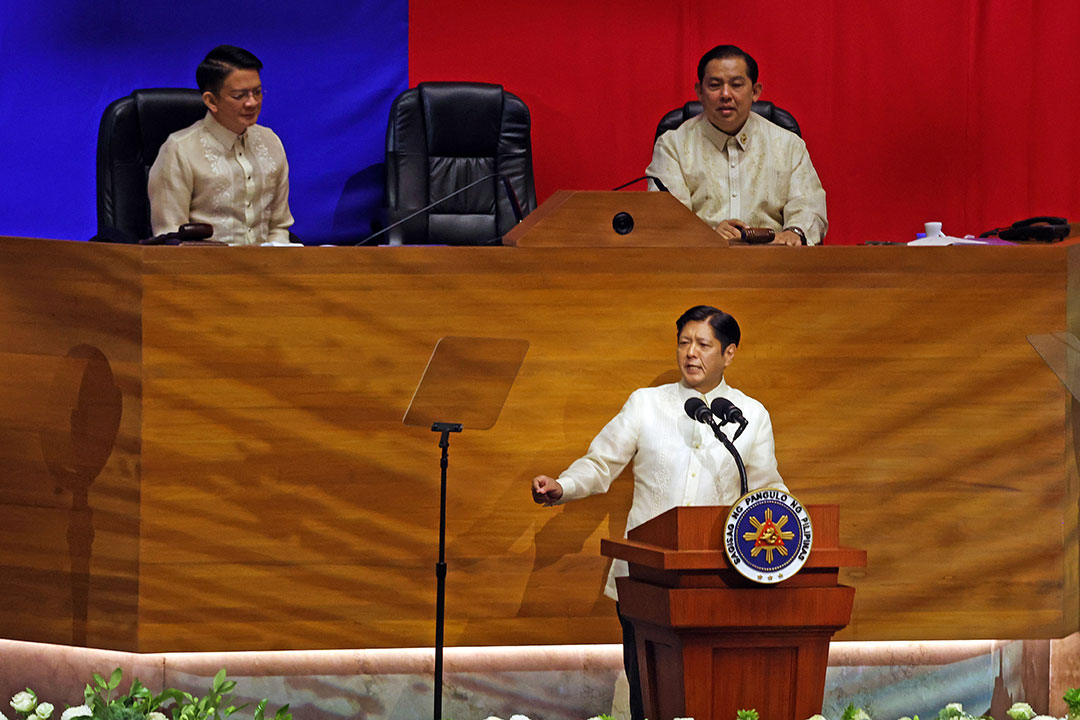
Thinking Beyond Politics
By Victor Andres C. Manhit

To be chief executive means being able to meet all challenges that a country is facing on all fronts. The concerns are by no means few, with each government agency and their stakeholders having their own universe of complex challenges. It is the job of a President to acknowledge that these issues exist, to take measures to respond to them, yet also choose from the myriads of concerns, identify priorities, and distinguish the “important” from the “important and urgent.”
This was apparent in Monday’s State of the Nation Address (SONA), the third by President Ferdinand Marcos, Jr. The main message delivered by the President was a direct response to what Filipinos were saying. The people’s clamor was, in fact, loud and unequivocal, coming from the people’s gut.
A June survey by Pulse Asia, commissioned by Stratbase, revealed that 57% of Filipinos wanted to hear the President’s plans on controlling inflation during the SONA. An earlier survey by the same polling firm showed that 72% of Filipinos believe inflation to be the most urgent concern in the country.
Meanwhile, a survey by OCTA, conducted between June 26 and July 1, revealed that controlling the increase in the prices of basic goods and services remains the top concern of 65% of adult Filipinos, spanning all geographic areas and income classes.
Further, according to OCTA, other most urgent national concerns for adult Filipinos are “Access to affordable food like rice, vegetables, and meat” (40%), “Increasing/improving wages or salaries of workers” (33%), “Creating more jobs” (33%), and “Reducing poverty” (28%).
Such findings complement the findings of another firm, Social Weather Stations, that found last month that 16 million families considered themselves poor.
The Pulse Asia survey also found that 36% of Filipinos would like to hear the concrete actions of the Marcos Jr. administration on improving the national economy, and 35% of Filipinos wanted to hear how the current administration is working to create more employment opportunities for the people.
These are what the people believe are urgent, demand action, and by which they will measure the responsiveness success of this administration.
To the President’s credit, at the outset of his speech he acknowledged that good economic statistics meant nothing if the people cannot feel these in their daily lives.
This SONA gave us a clear idea of what the administration has made a priority so far, and what we can expect in the next three years. Then again, inflation, an inevitability in any economy, spills over to other issues and impacts the prices of goods, the pace of growth, and the quality of life of every Filipino.
For example, the Philippines has long been a consumption-driven economy and remains to be so. This is not sustainable for the economy, because mere consumption makes the economy vulnerable to external and internal disruptions.
For instance, the growing concern over inflation was reflected in the latest Consumer Outlook Index of the Bangko Sentral ng Pilipinas (BSP) where it showed that consumer sentiment for the second quarter of 2024 was more pessimistic as the percentage of pessimists outweighed the increase in the percentage of optimists.
Because of this, the national economy must shift to investment-led growth. Pursuing investment-led and job-generating growth creates a ripple effect that significantly boosts the nation’s productivity and economic output.
However, a deal-breaking factor raised by investors, which also drives inflation, is the cost of power generation because of our dependence on expensive and volatile imported fuel. The government should consider removing the VAT on electricity and fuels used for generating electricity to reduce the financial burden on consumers, stimulate economic growth by lowering operational costs for businesses, make energy more affordable, ultimately boosting both macroeconomic stability and microeconomic welfare.
We have been hearing the word “security” a lot lately. This has many contexts. For instance, we can be referring to ensuring that the West Philippine Sea, as established by international law and upheld by the Permanent Court of Arbitration in 2016, remains ours. But economic security — when ordinary citizens are able to meet their daily needs consistently and sustainably — is also a form of security.
A shift to investments will ensure that the above-mentioned benefits will redound to the welfare of Filipino families, today and in the foreseeable future. Security also means enabling the people to protect themselves against scammers, fraudsters, and hackers, from individual accounts to national critical infrastructure. In this regard, there remains much to do, even as we are assured of help from like-minded partners from other countries. The recently released National Cybersecurity Plan must be implemented as intended and periodically evaluated to ensure it keeps up with technological trends.
Finally, we cannot underscore enough the importance of making the Philippine economy resilient to external threats and economic coercion. Working with like-minded states such as the United States, Japan, Australia, Canada, and the EU to form strategic partnerships to promote trade and collectively address global challenges such as inflation and economic instability can also help the country achieve national security.
Now that the SONA has been delivered, the work cut out for us is clear. We should remember that the betterment of society does not merely rely on government actions. It is, instead, a collaborative effort on the part of the public sector, the private sector, civil society, and the rest of the Filipino people. This whole-of-society approach will ensure that nobody is left behind and we are all aware that everybody, whatever our political leanings or advocacies, has a stake and a duty in ensuring a sound and promising state of our nation.
Victor Andres “Dindo” C. Manhit is the president of the Stratbase ADR Institute.